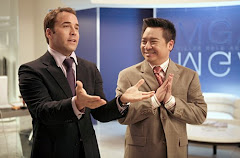
It is still tough, regardless of the progressive strides that America has taken, for an Asian American to truly fit in to society, especially in schools. Jay Matthews’ "Asian American Students and School Stereotypes" introduces the idea of discrimination against Asian Americans in schools around the country and discusses in detail a small yet very intriguing study done by an undergraduate student at Harvard University. Jenny Tsai, a Chinese American, created the study ‘Too Many Asians at this School’; a study in which Tsai interviewed 27 Harvard undergraduates (15 Asian Americans, 12 whites, and one Asian American at Boston College). The information she uncovered in these interviews (all of these students attended top academic high schools) was very revealing to the outlook Asian Americans have in a school environment. Tsai found that the majority of these Asian Americans felt that acting “white” was considered to be a good thing (Matthews, 1). Although the undergraduates at Harvard are very dedicated and hard-working students, Tsai explains that these Asian American students felt cool by acting “white”. Tsai wrote in her study that “among blacks, ‘acting white’ is socially stigmatized, but Asian students who ‘act white’ usually occupy the more socially prestigious positions” (‘Too Many Asians at this School). Towards the middle of the article, Tsai this point of acting “white” is reiterated: “They [Asian Americans] saw having only white friends as sort of a badge of honor” (Matthews, 1). The conclusion of this article deals with the idea of racism. Tsai said that many Asian students at Harvard felt that their label as the “model minority carried a negative connotation of being competitive, lacking passion and being calculating” (‘Too Many Asians at this School). The variety of stereotypes that have been attached to Asian Americans (especially dealing with academics) has changed their culture and ways of life.
Although I can not respond to this article first hand (I’m not Asian), I do have thoughts on a few topics discussed throughout the article. First, the statement that Tsai uses in her study about black people not wanting to act “white” while Asians do in fact want to act “white” is very accurate. The stereotypes created by society have given African Americans a tough and “ghetto” complexion as opposed to the Asian Americans who have received the nerdy and smart complexion. The African Americans do not want to take a step down whereas the Asian Americans want to take a step up by acting “white”. Obviously, not all black people are “ghetto” and not all Asians are nerdy; unfortunately this is what American society has come to. In a day and age where appearance is everything, Asian Americans have begun to change their way of life because of what other people think of their race as a whole. Michael Friedberg, the second person reading Monkey Bridge, read an interesting article that basically stated that all Asians (Koreans, Chinese, Japanese, etc.) are group as one race throughout society. The many different Asian countries carry tons of culture and tradition that are very different from one another. Similarly, the large amounts of Asian Americans are not all the same people; they have different characteristics and ways of life from one another. My final thought on this topic is my personal thought on the origin of the academic stereotypes that Asian Americans face everyday. There are always stories on the news and Internet of Asian parents pressuring their kids to get good grades and study for hours every day in order to get into prestigious colleges and receive prestigious jobs. I think that Asian people are brought up a different way than Americans are because of their culture. The ways of life of people growing up in Korea or Japan are much different (in most cases) than those of people growing up in America. Their cultures and values are undoubtedly unlike those of America. Once again, not all Asian Americans are raised in a strict and unforgiving household, but this is where I think the stereotypes stem from. The fact of the matter is stereotypes towards different racial and ethnic groups must be erased in order for American society to truly be successful.
As society continues to make strides in the right direction, it is regressing at the same time. Jenny Tsai’s study brings the Asian American’s view on their many stereotypes regarding academics and school in general. It seems, after reading the article, that many Asian Americans are beginning to forfeit their traditions, culture, and personalities because of the way in which they are viewed by society. Sure, many Asian students do attend prestigious universities and colleges, but this does not mean that they are all nerds. There should not come a time in which a race of people feel the need to abandon their identities in order to “fit in”; unfortunately it feels as if this time is beginning to come. All races, from Hispanics and Blacks to Asians must accept who they are.
Matthews, Jay. "Class Struggle:Asian American Students and School Stereotypes."
The Washington Post [Washington D.C.] 8 Jan. 2008: 1. 17 Mar. 2009


The article you picked raises some very pointed ideas. If we got into a real discussion about this topic, I bet it would be one of the more interesting ones we had all year. The point of the discussion was to bring in the book too, and that is unfortunately missing. I am curious as to how your book shows what this article is talking about. But, your post starts a discussion on this topic, and that is what good blogs do.
ReplyDelete48
ReplyDelete